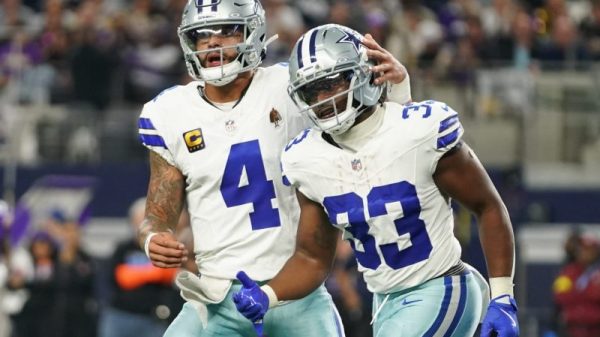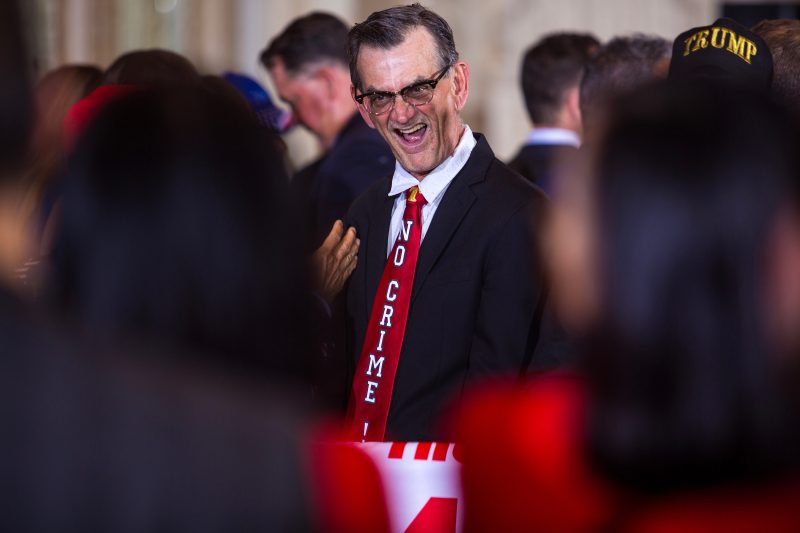One of the tactics that Donald Trump has long used to bolster his public support has been to throw out specious claims at a blistering pace, understanding that only one needs to be convincing to win people over to his side.
He’s spent more than two years making often contradictory claims about the election being stolen, for example, from votes being flipped by machines to mail-in votes being cast illegally to a nebulous conspiracy aimed at dampening his support. You don’t have to believe all of those things are true, but if you believe one is, he’s earned your sympathy for his case that he should still be president.
For those skeptical of Trump, this doesn’t work. His record of falsehoods means that many Americans are inclined not to give him the benefit of the doubt, preferring to assume his assertions are untrue until proven not to be. Throwing lots of things against the wall doesn’t work if people ignore what you’re throwing.
In this moment, though, the dynamic is reversed. Trump is currently the subject of a number of wide-ranging investigations into possible or alleged criminal activity, a galaxy of probes that cover his private business, his 2016 and 2020 election bids, and his post-presidency.
And many of his supporters simply reject all of them, wave all of them off as invalid given the source, just as Trump critics do of the former president’s claims. This response has itself been cultivated by Trump, stoked by his years of insisting that investigators have been targeting him unfairly, looking for any excuse to take him down. (How has he built up that belief among his supporters? By making incessant, often misleading claims about malfeasance by investigators and enjoying the fact that some of them have stuck.)
The result is that, while three Americans think Trump has probably committed a serious crime at some point in his life for every two who say he hasn’t, Republicans are four times as likely to say he’s never committed a serious crime as they are to say that he has. In Yahoo News polling conducted by YouGov, 6 in 10 Republicans said Trump has never committed a serious crime.
Even when the pollsters offered specific examples, Republicans rejected the idea. Did Trump break the law in trying to overturn the election results? Four in 10 Americans say yes; 7 in 10 Republicans say no. Did he break the law in inciting the Capitol riot? Four in 10 overall say yes; three-quarters of Republicans say no. Did he take classified documents after leaving office? Four in 10 overall say yes; two-thirds of Republicans say no. And so on.
It is unlikely that Republican respondents were considering each of those questions in isolation. Instead, it all gets waved away: Trump’s not a criminal, so of course he didn’t do those things.
If need be, explanations can be conjured up. Trump recently shared a list from writer Paul Sperry dismissing various probes into Trump, like claiming that Trump was, for example, being investigated for “a speech on the Ellipse” — as though that speech was the entirety of Trump’s culpability for the Capitol riot, as though that crowd simply showed up that day for no reason and were infuriated about alleged voter fraud for no discernible reason. But this is how it works: Find one thing that sticks.
But let’s now take a step back and consider what is required to reject out-of-hand the possibility that Trump violated the law. It’s probably easier to go by jurisdiction.
We start here in part because special counsel Jack Smith, leading the federal investigation, is not a political actor. Trump likes to suggest that other investigations are a function of left-leaning prosecutors looking for the political benefits of securing an indictment against the former president. Trump’s thrown a lot against the wall in an effort to pigeonhole Smith that way, without much success.
So what is Smith investigating? As with other investigations, a shroud of secrecy surrounds his work. But reporting from The Washington Post and others offers some insight.
On Wednesday, for example, The Post reported that Smith’s team was investigating whether Trump’s robust post-election fundraising effort criminally “scammed donors by using false claims about voter fraud to raise money.” The New York Times, meanwhile, reported that Smith’s team had been asking witnesses whether Trump had shown them a classified map after leaving office that included “sensitive intelligence information.”
That improper use of classified material overlaps with the special counsel’s broader consideration of whether Trump violated the law by retaining presidential records after leaving office, including some that might have been classified. This probe is complicated by the possibility that Trump obstructed efforts to collect the documents illegally, a possibility reinforced by a Trump attorney’s having attested last June that no documents with classification markings were still in his possession. They were.
Prior reporting by The Post has indicated that Smith’s team is also looking at Trump’s efforts to retain the presidency despite his 2020 loss. In addition to possible questions about the effort to stand up alternate slates of electors on invalid grounds. It may include consideration of Trump’s role in the riot itself. The House select committee probing Jan. 6 built an argument that Trump engaged in obstruction of an official proceeding or conspiracy to defraud the United States, for example.
The most obvious starting point here is Manhattan, where District Attorney Alvin Bragg already obtained an indictment against Trump on 34 felony charges of falsifying business records. Those charges were felonies because the alleged falsification was in service to another crime, possibly violations of state or federal election law centered on Trump’s efforts to bury a story of an alleged affair before the 2016 election. (The Federal Election Commission declined to recommend federal charges against Trump, splitting a 2-2 decision on partisan lines. Trump’s former attorney Michael Cohen pleaded guilty to such charges in 2018.)
(Trump was in New York again on Thursday as part of a lawsuit filed by Attorney General Letitia James, but that is a civil inquiry about alleged Trump Organization fraud, not a criminal one.)
It’s likely that there will soon be criminal charges filed against Trump in Georgia, as well. Fulton County District Attorney Fani Willis empaneled a special grand jury that released an initial report hinting that indictments would follow.
Those would likely focus on Trump’s efforts to overturn the election results in that state, an effort that included pressuring state officials to “find” enough votes for him to be declared the winner, as recorded in a phone call obtained by The Washington Post. CNN reported that Trump might be indicted on conspiracy or racketeering charges.
To assert flatly that Trump never committed a serious crime is to assert confidence in his never having violated the law in any of the ways shown in bold above. It’s to assert that he didn’t do any of the crimes that multiple investigators at the federal and local level reportedly believe he might have committed. Many Republicans, though, just wave it all away.
There’s a natural response that this will trigger: Why shouldn’t these allegations be waved away when so many people are willing to categorically wave away those claims Trump’s chucking against the wall?
The first response is that elected district attorneys and Smith, former head of the Justice Department’s Public Integrity Section, have not repeatedly demonstrated their willingness to embrace falsehood or deception as readily as Trump has. And the second response is that they shouldn’t, that non-facially-ridiculous questions raised by Trump and his allies deserve adjudication, which is why the media has filed so many fact-checks in the past eight years.
That question can also be countered with another question.
What if — just consider the possibility! — Trump did violate one of the aforementioned laws? What should follow?



























